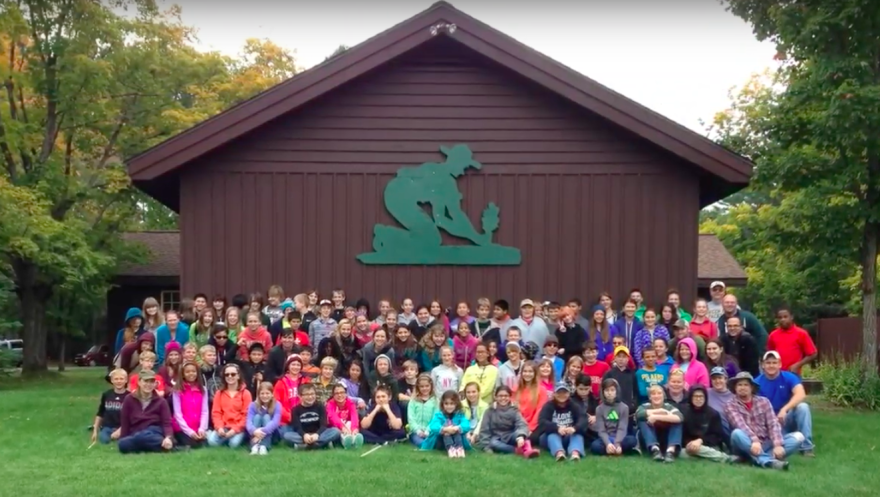Last summer, WXPR embarked on their Curious North Road Trip to the public library in Manitowish Waters, where Graham Brown, an Australian man with many questions about life up here in the Northwoods, posed a Curious North question.
Brown asked how fish survive the cold winters trapped beneath our vast frozen lakes.
“I became interested in how the fish look after themselves in the very cool part of the year when the lakes were frozen,” Brown said. “Whether they hibernated, or whether they basically just swam around under the ice and where they got their oxygen from and food.”
Brown said he was surprised to learn that fish and other animals survive our harsh winters unscathed, especially since the climate in Australia is quite different from our own in Wisconsin.
“I’m not used to having lakes that freeze,” Brown explained. “In the higher country on the eastern seaboard, they have small lakes that freeze. But in the Main, they don’t. So having animals live under ice is not something I’m aware of.”
In order to answer this question, we visited Trees For Tomorrow (TFT) in Eagle River, where Educator Todd Starling took a group of Road Scholars fishing on Silver Lake.

On our trek to the best fishing spot, we got the lo-down on how fish adapt to colder climates.
Starling said that in the summer, the water in a lake is separated into two zones, with the relatively warmer and more oxygenated water near the surface and the colder, less-oxygenated layer at the bottom of the lake. This temperature gradient is called a thermocline.
“When you jump in a lake and it feels colder down, that’s because the colder water, in theory, sinks,” Starling said.
But due to the differing densities of the cold and warm waters, these zones don’t mix when the weather stays mild. But during the winter, the surface temperature of the water cools along with the air, causing the colder water from the surface to sink which in turn allows the cold and warm waters to mix freely, a process known as “lake turnover.”
“When you start to get cold water on top, it starts to cycle the warmer water underneath,” Starling explained, “and that turns over and reoxygenates the water before winter.”
Starling said these unique properties of water make life on this planet possible.
“The densest water is 39? and that’s what gives ice the ability to float,” Starling said.

That’s also why lakes freeze from the surface down rather than from the bottom up — the water under the ice, freshly reoxygenated from the fall turnover, remains at 39? all winter long, allowing fish to survive until the spring.
On the lake, Road Scholar Donna Johnson asked Starling for clarity.
“So where are all the fish?” Johnson asked.
“All throughout,” Starling replied.
“So they don’t freeze because it’s never 32? in the water?”
“Correct.”
“Because it wouldn’t be water otherwise.”
“Yes, and that’s the beautiful thing about water — that’s what makes this planet habitable.”
On the lake, we also learned how to drill a hole with an ice auger, how to bait a line and how to set up tip-ups. Starling even provided us with a few coveted fishing tips.
“There are times in the winter where fish will go on a small migration and find the more oxygenated water,” Starling advised. “So as a fisherman, you follow the oxygen.”
Another question Brown had was how do the fish survive with less space once the lakes freeze?

TFT Educator Kim Feller explained that since the fish are left with less open water to live in, predator and prey fish have a higher chance of interacting.
“Fish have to eat other fish, so now they don’t have to travel quite as far and expend that energy,” Feller explained. “If you’re a prey fish, it might not be so good for you because now your predator is closer.”
So with less space for the fish to swim around, their food source is actually closer. Another question Brown asked is how do the fish survive with less oxygen?
Feller said fish naturally decrease their movement to conserve energy and oxygen during the winter months, but the oxygen availability in shallow lakes is a concern during extremely cold winters.
“There are a couple lakes here in Vilas County that are maybe five feet deep in the summer,” Feller said, “and if it’s really cold, now if you have two feet of ice then you only have three (more) feet of vertical space for those fish. In extreme cases, we see the winter die offs.”
But Feller assured me those cases are rare. She said the cycle of nature exists so that fish and other mammals are able to adapt to their environment. If this question had to be answered in one word, it would be “adapt.”
But in contrast to our resource-rich environment here in the Northwoods with an overabundance of lakes and forests, Brown’s hometown in Adelaide, Australia, looks quite different from our own. For one thing, it’s currently summertime in the southern hemisphere! But even in the winter, Brown said their maximum temperature is around 50-60?.

“Where I live is a more temperate, Mediterraean climate. It rarely snows,” Brown said. “We actually get a lot of dry lakes, or salt lakes. In the Main, they’re just big expanses of salt.”
Brown said he realized on his trip to Wisconsin that locals are tuned into their natural environment and take time to enjoy the nature around them.
“In Manitowish Waters, I found that people had a strong connection with their environment,” Brown said, reflecting on his time spent enjoying area lakes and biking trails.
While it may be easy to forget, our link to nature is something truly unique to this corner of the world.





